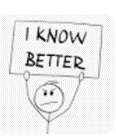Parshas Bo
Do We Really Know Better?
“[Pharaoh] called for Moshe and Aharon that night and said, “Get up and go from among my people, both you and B’nei Yisrael. Go worship Hashem as you have said [requested].” (Shmos 12:31)
The 9th plague that Hashem punished the Egyptians with, was the plague of choshech, darkness. Rashi (Shmos 10:23) says that during the first 3 days it was so dark that the Egyptians were unable to see each other. Over the next 3 days, the darkness was substantive. It was so palpably dark that the Egyptians could not move. They were frozen in place. If an Egyptian happened to be sitting when this second period of darkness began, he was unable to rise. If he had been standing, he would have been unable to sit.
The Chasam Sofer says that the Jewish People had a golden opportunity during this plague. They could have risen and killed the Egyptians! Then they could have escaped from Egypt without a fight. Why didn’t they? The Chasam Sofer quotes Targum Yonasan ben Uziel (Bereishis 50:25) who explains that Yosef had made the Jewish People swear that they would not attempt to leave Egypt before the time that Hashem had designated. When would that time be? Yosef had told them that two people would come to take them out. The two would say the code words, “פָּקֹ֧ד יִפְקֹ֣ד אֶתְכֶ֗ם”, “Hashem will surely remember you”.
Luckily, the Jews listened to the promise and waited for Moshe and Aharon who used these code words. A tragedy had occurred 30 years earlier. The Midrash (Shmos Rabbah 20:11; Midrash Lekach Tov, Midrash Sechel Tov 13:17) tells us that the tribe of Ephraim miscalculated the date which they thought was the designated date for freedom. Their calculations were off by 30 years. They escaped from Egypt but did not wait for the two redeemers who would say the “code words”. It was a tragic mistake. After leaving Egypt early, 300,000 Jews from the tribe of Ephraim were killed by the Plishtim.
The Chasam Sofer’s explanation helps explain another Midrash (Shmos Rabbah 14:1). The Midrash says when Hashem decreed that the Egyptians deserved the plague of darkness, all the angels concurred. Even the guardian angel of Egypt agreed. The Satmar Rebbe (quoted in Talelei Oros by Rabbi Yissachar Dov Rubin) wondered why this plague was unique in that it received the approval of the guardian angel of Egypt.
The answer is that the guardian angel of Egypt realized the inherent danger to the Jewish People. While the Egyptians were immobilized, the Jews had the opportunity to escape. They could have finally become free! However, it was not yet the moment that Hashem had decreed for them to go free. Had they left then, it would have been too soon. They would have met the same fate as the Jews from the tribe of Ephraim and would have been killed. That is what the guardian angel of Egypt had hoped would happen. However, since the Jews had total faith in Hashem and did not leave a moment too soon, their lives were spared!
There was a similar occurrence by makas bechoros, the plaue of the killing of the firstborn. The Torah says (12:31), “[Pharaoh] called for Moshe and Aharon that night and said, “Get up and go from among my people, both you and the B’nei Yisrael. Go worship Hashem as you have said [requested].” After midnight, the Egyptians were pressing the Jews to leave Egypt. The Jews had been waiting for this opportunity for so many years! Yet the Jews did not leave until the morning. Rav Yaakov Kaminetsky zt”l (Emes L’Yaakov) says that the Jews knew from past experiences that Pharoah had changed his mind about freeing them on many occasions. Perhaps he would change his mind, now, as well. Why didn’t the Jews take the opportunity and leave? Rav Yaakov zt”l answers that the Jews were given a directive from Hashem not to leave their homes until morning. Despite being faced with the opportunity for immediate freedom, they listened to the command of Hashem and waited for the designated moment.
There are times in our lives when we have temptations and rationalizations. As a result, we may feel that “we know better” and do not have to scrupulously follow the laws of the Torah.
That is a big mistake which can lead to negative repercussions.
We only gain when we follow Hashem’s directives.





